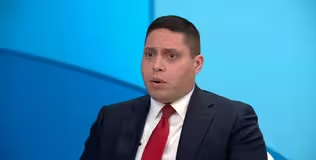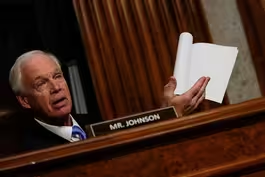
Taiwan boosting defenses to resist Chinese aggression
Clip: 4/3/2025 | 11mVideo has Closed Captions
How Taiwan is boosting its defenses to resist Chinese aggression
Taiwan has long been the most tense flashpoint between Washington and Beijing. By law, the U.S. is required to help Taiwan defend its democracy. This week, China’s People’s Liberation Army launched new drills and sent ships around Taiwan. The U.S. said the moves “put the region’s security, and the world’s prosperity, at risk.” Nick Schifrin reports for our series: Taiwan: Risk and Resistance.
Problems playing video? | Closed Captioning Feedback
Problems playing video? | Closed Captioning Feedback
Major corporate funding for the PBS News Hour is provided by BDO, BNSF, Consumer Cellular, American Cruise Lines, and Raymond James. Funding for the PBS NewsHour Weekend is provided by...

Taiwan boosting defenses to resist Chinese aggression
Clip: 4/3/2025 | 11mVideo has Closed Captions
Taiwan has long been the most tense flashpoint between Washington and Beijing. By law, the U.S. is required to help Taiwan defend its democracy. This week, China’s People’s Liberation Army launched new drills and sent ships around Taiwan. The U.S. said the moves “put the region’s security, and the world’s prosperity, at risk.” Nick Schifrin reports for our series: Taiwan: Risk and Resistance.
Problems playing video? | Closed Captioning Feedback
How to Watch PBS News Hour
PBS News Hour is available to stream on pbs.org and the free PBS App, available on iPhone, Apple TV, Android TV, Android smartphones, Amazon Fire TV, Amazon Fire Tablet, Roku, Samsung Smart TV, and Vizio.
Providing Support for PBS.org
Learn Moreabout PBS online sponsorshipGEOFF BENNETT: Tonight, we begin a series of reports from Taiwan.
The leader of the self-governing democracy of more than 23 million people argues the island is already sovereign and independent.
But Beijing calls it a renegade province and vows to one day unite it with the mainland either peacefully or by force.
Nick Schifrin recently traveled to Taiwan and joins us now.
So, Nick, what did you find?
NICK SCHIFRIN: Geoff, Taiwan has long been the most tense flash point between Washington and Beijing.
By law, the U.S. is required to help Taiwan defend its democracy, which also produces the vast majority of the world's most advanced computer chips.
This week, China's People's Liberation Army launched new drills and sent ships that ringed around Taiwan.
The U.S. said the moves -- quote -- "put the region's security and the world's prosperity at risk."
Tonight, we look at Taiwan's military, the steps it's taking to boost the island's defenses and the debate in Washington over whether it's doing enough, the beginning of our series, Taiwan: Risk and Resistance.
In Western Taiwan, the army is training for war.
The 584th Brigade headquarters is assaulting its own base captured by a red-hatted enemy commanders identify as China that doesn't put up much of a fight.
It's a simulation with tanks whose parts date back 70 years and a drone that couldn't fly because it was too windy.
Privately, Taiwanese officials admit they're not ready for the Chinese army.
But under the steady eye of forefather Sun Yat-sen, Commander Lt. Col. Gong Shu Wei says they're getting there.
Are Taiwanese soldiers ready to defend Taiwan?
LT. COL. GONG SHU WEI, Battalion Commander, Army Armored 584th Brigade (through translator): Yes, we are always on the front lines, ready to defend the country and resist any enemy attack.
NICK SCHIFRIN: For years, the U.S. has urged Taiwan to focus less on big expensive weapon systems that are unlikely to survive a Chinese invasion, and instead fight like Ukraine.
Ukrainian soldiers use mobile weapons like the Javelin to disable Russian tanks.
After years of debate, Taiwan has largely embraced some of the same weapons, the idea of fighting like a porcupine, making itself impossible or fatal to swallow, including with the Javelin that Marine Sergeant Wang Zhi Han trains to set up quickly.
SGT.
WANG ZHI HAN, 99th Marine Brigade (through translator): When we prepare for war, we train with the Javelin.
NICK SCHIFRIN: Taiwan is also more than quadrupling its inventory of the Stinger that allows a smaller military to target a larger military's helicopters and jets.
BAO WEIZHONG, 99th Marine Brigade (through translator): I think the Russia-Ukraine war is a wake-up call for Taiwan.
Like Ukraine, we have a powerful adversary nearby.
Its that's why we need more asymmetric weapons to strengthen both our air defense and ground forces and counter a powerful air force, such as China.
NICK SCHIFRIN: China's People's Liberation Army has launched one of the fastest military modernizations in world history.
The U.S. says the builder buildup is custom-designed to prevent U.S. forces to come to Taiwan's rescue, as demonstrated in these propaganda videos, and to be able to invade Taiwan by 2027.
The U.S. says this week's exercises are practice for a blockade of Taiwan.
Part of those exercises, this cartoon.
Taiwanese President Lai Ching-te is a parasite who will be barbecued as Chinese weapons strangle Taiwan.
One of the keys to defending Taiwan is this water, the Taiwan Strait.
If Beijing were to ever decide to invade, it would need to launch a massive amphibious assault.
And Taiwanese and U.S. officials hope that Taiwan can develop the capability to turn strait into the Chinese navy's graveyard.
To do that, the U.S. has pushed Taiwan towards new asymmetric weapons that can target Chinese ships, such as this missile launched from the back of a truck.
The unit is commended by Lt. Col. Zhuang Guanghao.
LT. COL. ZHUANG GUANGHAO, Mobile Missile Launcher Group (through translator): Because the mobile missile launcher has high mobility, high concealment, and highly effective firepower, we can use a single mobile missile launcher to inflict significant damage on the enemy.
NICK SCHIFRIN: And against that Chinese enemy, Taiwan would also use a new fast boat that lays mines.
We get a tour.
The ship is designed to protect Taiwan from Chinese assaults.
ANDREW YANG, Former Taiwanese Defense Minister: The problem for us right now is that we still are short of manpower for the armed forces.
NICK SCHIFRIN: Andrew Yang is Taiwan's defense minister.
He and other analysts worry that Taiwan's government hasn't spent enough on defense and the army doesn't have enough well-trained troops.
ANDREW YANG: The retention rate is still very low.
So we have to find ways to keep the well-trained officers, NCOs and men in the armed forces.
We have to improve our defense capability for the wartime.
NICK SCHIFRIN: That requires lots of weapons, many of them American, one of the most expensive, F-16s.
The first Trump administration approved an $18 billion sale of F-16s to Taiwan.
Once they actually arrive, Taiwan would have 200 F-16s, the largest number of F-16s in Asia.
But the deliveries of F-16s and many American weapons, are often delayed.
Pilot Lieutenant Colonel Liu Yong-Cheng says Taiwan needs them quickly.
He's been a pilot for 12 years and has never been busier.
Chinese planes have flown closer to Taiwan more often than ever before.
What do you think the F-16s can do against Chinese jets that are more modern and they have a larger fleet?
LT. COL. LIU YONG-CHENG, 4th Tactical Fighter Wing, 24th Squadron (through translator): Taiwan has upgraded the F-16s' capabilities and acquired new equipment, but I believe training the operators is just as important as having advanced equipment.
We are always prepared to take off at any time.
NICK SCHIFRIN: To be more prepared and deter a Chinese invasion, last summer, before his second election, President Trump demanded Taiwan spend 10 percent of its GDP on defense.
SCOTT BESSENT, U.S. Treasury Secretary: I follow President Trump's lead, and he is confident that President Xi will not make that move during his presidency.
NICK SCHIFRIN: That confidence is reflected in the Trump administrations new interim national defense strategy, which has unprecedented language about Taiwan -- quote -- "Denial of a Chinese fait accompli seizure of Taiwan, while simultaneously holding the U.S. homeland, is the department's sole pacing scenario."
To achieve that, it allows for greater risk in other theaters, including Europe and it calls for pressure on Taiwan to increase defense spending, two defense officials tell "PBS News Hour."
MAJ. GEN. SUN LI-FANG, Taiwanese National Defense Ministry Spokesperson: When we talk about defend our country, we mean defend my -- our home, our family, our loved one, and our democracy.
NICK SCHIFRIN: Major General Sun Li-Fang is Taiwan's top military spokesperson.
He says China's goal is to present overwhelming force to undermine Taiwan's will to resist and use other efforts, like this deepfake, to undermine Taiwan's democracy.
MAJ. GEN. SUN LI-FANG: Win without fight, actually, is the most important principle, according to Sun Tzu "Art of War" to try to influence the perception of people in Taiwan.
NICK SCHIFRIN: They're trying to reduce people's willingness to fight.
MAJ. GEN. SUN LI-FANG: You are right.
NICK SCHIFRIN: And what are the main lessons that Taiwan is taking from Ukraine?
Here, he switches to mandarin.
MAJ. GEN. SUN LI-FANG (through translator): The first aspect is demonstrating our determination to defend ourselves and ensuring we are fully prepared.
That might be the most important.
NICK SCHIFRIN: The battlefield lessons from Ukraine, Taiwan needs lots more cheap drones, with technology to repel jamming, secure satellite communications like Ukraine uses Starlink.
And Taiwan has watched attacks on Russian and Ukrainian logistics.
So it needs to better disperse and protect its own munitions.
Overall, Sun cites two major recent steps.
Mandatory military service has been extended to one year from four months, with more intense training.
And President Lai wants to boost military spending from 2.5 percent to more than 3 percent of Taiwan's GDP.
LAI CHING-TE, Taiwanese President (through translator): China's ambition over the past several decades to annex Taiwan has not changed for even a day.
By its actions, China already satisfies the definition of a foreign hostile force.
We have no choice but to take even more proactive measures.
ELBRIDGE COLBY, U.S.
Undersecretary of Defense Nominee: I agree with President Trump that they should be more like 10 percent.
NICK SCHIFRIN: At his nomination hearing last month to become the top Defense Department policy official, Elbridge Colby urged Taiwan to spend more, and bipartisan senators accused Taiwan's legislature of recently voting to reduce defense spending.
SEN. DAN SULLIVAN (R-AK): They need to realize they're playing a dangerous game, OK?
Cutting defense spending right now is not the right signal.
SEN. ANGUS KING (I-ME): How are we to be expected to think about sending Americans into harm's way on behalf of a of an entity that doesn't seem all that interested in protecting itself?
ELBRIDGE COLBY: Not only do I don't think its fair to Americans to ask Americans and our service men and women to suffer at great -- if our allies are not pulling their weight, but also that it won't even be viable.
ALEXANDER CHIEH-CHENG HUANG, International Affairs Director, Kuomintang: There is no way that we will accept the accusation that we cut defense budget.
NICK SCHIFRIN: Alexander Huang is the director of international affairs for the Kuomintang, the party that leads the coalition in charge of Taiwan's legislature.
He says their lawmakers lowered all government spending and didn't target defense and they will support an upcoming vote to increase military spending.
ALEXANDER CHIEH-CHENG HUANG: We will support the U.S. arms sales to Taiwan, no matter it's foreign military sales or direct commercial sales.
We support that 120 percent.
NICK SCHIFRIN: And he says Ukraine has woken up all Taiwanese to a stark reality.
ALEXANDER CHIEH-CHENG HUANG; The United States will not put the boots on the ground in Ukraine.
That clears some of the illusions that Taiwan had in the past that the United States G.I.
will come and fight for us.
We need to defend our homeland by ourselves.
NICK SCHIFRIN: In our next story, we will look at Taiwan's efforts to try and make its society and its people, not just its military, more willing to talk about the threat of war and more prepared to face an invasion.
Conservative lawyer on Trump's use of executive power
Video has Closed Captions
Clip: 4/3/2025 | 8m 25s | Conservative constitutional lawyer weighs in on Trump's aggressive use of executive power (8m 25s)
GOP Sen. Johnson says he supports tariffs but has concerns
Video has Closed Captions
Clip: 4/3/2025 | 7m 59s | GOP Sen. Johnson says Wisconsin bracing to see 'how painful' tariff fallout will be (7m 59s)
Markets plunge in wake of Trump's tariffs, trade war fears
Video has Closed Captions
Clip: 4/3/2025 | 11m | Markets plunge in wake of Trump's new tariffs and fears of global trade war (11m)
Trump resumes family detention in immigration crackdown
Video has Closed Captions
Clip: 4/3/2025 | 7m 2s | Trump administration resumes family detention in immigration crackdown (7m 2s)
Providing Support for PBS.org
Learn Moreabout PBS online sponsorship
- News and Public Affairs

FRONTLINE is investigative journalism that questions, explains and changes our world.

- News and Public Affairs

Amanpour and Company features conversations with leaders and decision makers.












Support for PBS provided by:
Major corporate funding for the PBS News Hour is provided by BDO, BNSF, Consumer Cellular, American Cruise Lines, and Raymond James. Funding for the PBS NewsHour Weekend is provided by...



